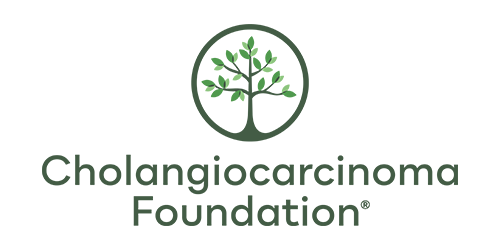Monthly Scientific Update – November 2022 (A recent study investigated the effects of PD-L1 expression on cancer cells and tumor-infiltrating immune cells in intrahepatic cholangiocarcinoma (CCA))
PD-L1 on Tumor-Infiltrating Immune Cells:
A Potential Prognostic Biomarker for Cholangiocarcinoma
Kelly Butler, Dr. Reham Abdel-Wahab
Patients may develop cancer when some organ cells acquire mutations that allow rapid and uncontrolled cell proliferation. To survive and spread beyond the initial tumor site, cancer cells must stop the body’s immune system from identifying the cells as cancerous and launching an anti-tumor immune response. This process is called immune evasion and is essential for cancer growth. Cancer cells can develop a variety of mechanisms for immune evasion.
One of the most common is the expression of a cell surface protein called PD-L1. How does this prevent an immune response? The PD-L1 on cancer cells binds to another molecule called PD-1 on T-cells of the immune system, which prevents the T-cell from killing the cancer cell (Figure 1, Standard Paradigm). Healthy immune cells can also express PD-L1, and these immune cells affect cancer growth when they enter the tumor microenvironment. (The tumor microenvironment is the area surrounding the tumor and includes immune cells, extracellular support structures, blood vessels, and nearby healthy cells). In prior studies, researchers have found that PD-L1 expression on immune cells in the tumor microenvironment creates an immunosuppressive environment that supports cancer growth.
A recent study investigated the effects of PD-L1 expression on cancer cells and tumor-infiltrating immune cells in intrahepatic cholangiocarcinoma (CCA). Of 136 patients included in the study, 39% and 35% had PDL-1 on cancer cells and tumor-infiltrating immune cells, respectively. These patients had better survival, but only PD-L1 on tumor-infiltrating immune cells remained a significant predictor after statistical adjustments for age and disease characteristics. Additionally, more immune cells in the tumor microenvironment were associated with better survival.
These results are consistent with a separate study on head and neck cancer but contradict the traditionally understood PD-L1/PD-1 model (Figure 1). PD-L1 overexpression on tumor cells has been found to support immune evasion and lead to poor outcomes in many cancer types. However this study found the opposite effect on survival in CCA patients. PD-L1 on tumor-infiltrating immune cells has also been found to drive immunosuppression, which is inconsistent with the survival benefit observed in this CCA study; Immune activation—not immunosuppression—typically leads to better outcomes for cancer patients.
Additional research is thus urgently needed to better understand the role of PD-L1 in
cholangiocarcinoma. This research could pave the way for new immunotherapy options and, ultimately, better outcomes for cholangiocarcinoma patients.

Kelly Butler is an NIH Postbac Research Fellow and the Founding Director of SAFE

Reham Abdel-Wahab is the Cholangiocarcinoma Foundation's Director of Research and Chief Scientific Officer.
